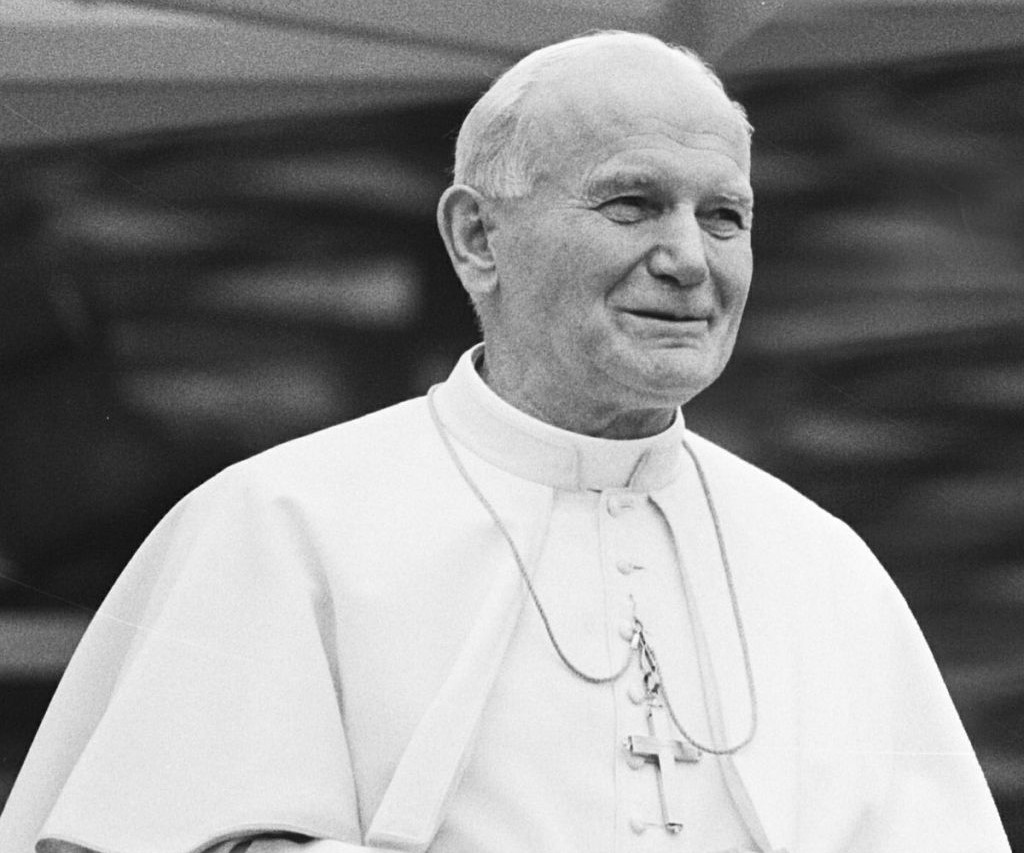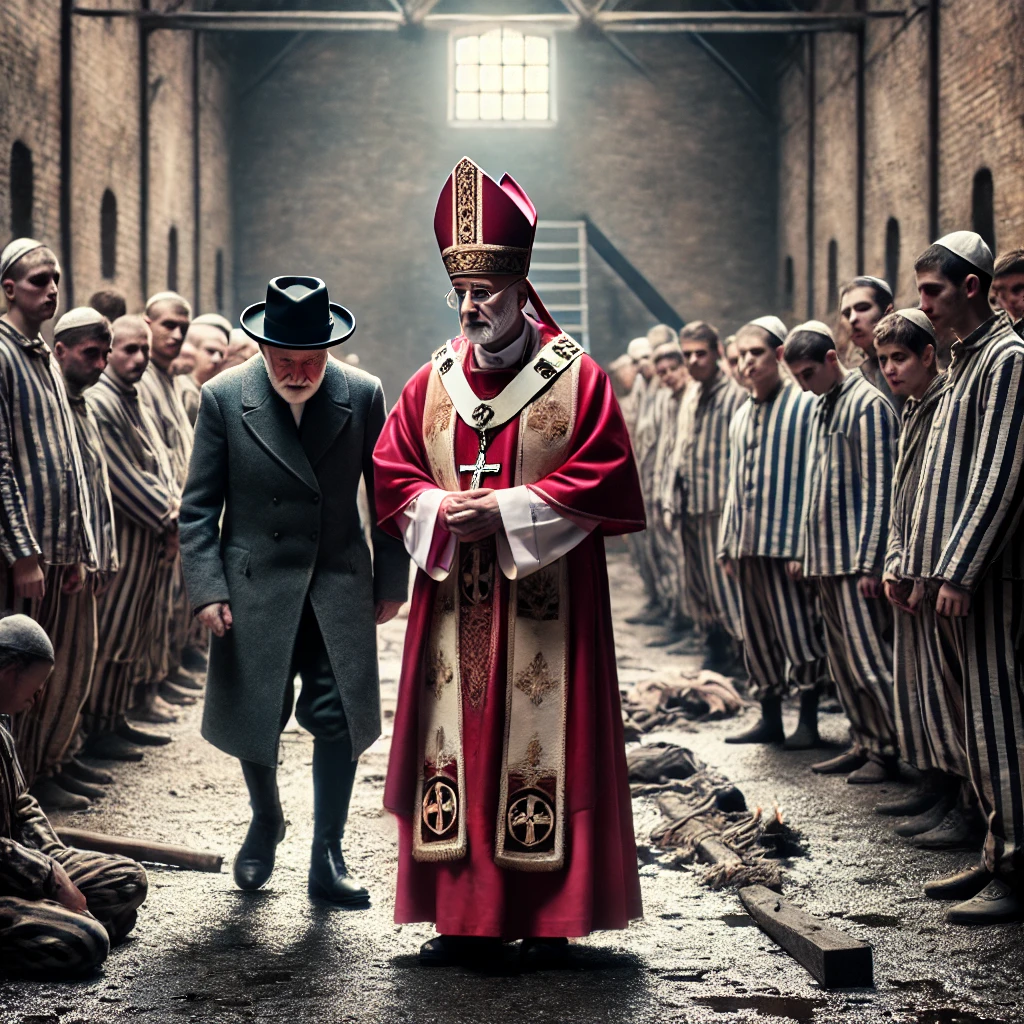When John Paul II Discerned Deceased Spirits At Auschwitz

The Message that the souls manifesting in the Auschwitz Concentration Camp are giving.
Today we at Forums in Peru want to talk about an impressive event that a cardinal recounted; it happened during a visit to the Auschwitz Concentration Camp.
As is so well-known, Auschwitz was a prisoner-of-war camp in Poland run by the Nazis and housing hundreds of thousands of Jews, other nationalities, dissidents, and also ordained Catholics.
But the absolute majority of those interned in Auschwitz were Jews.
This impressive supernatural experience lived by Cardinal James Hickey, who died in 2004, was shared with John Paul II, who gave him an explanation as moving as the experience of the cardinal himself.
Here we will tell you about the experience of Cardinal James Hickey at Auschwitz; the audience he had with John Paul II to tell him about it; and the amazing supernatural interpretation that the saintly Pontiff (himself a mystic) gave him.

Under the name Auschwitz, three camps operated between 1940 and 1945, during World War II , known respectively as the original concentration camp, the extermination camp, and the slave-labor camp.
The camps are located about 27 miles west of Krakow.
It was the largest Nazi extermination center; nearly 1.3 million people were interned there, of whom 1.1 million died.
The vast majority were Jewish, 90%, although Poles, Gypsies, prisoners of war, Communists, dissidents of the regime, etcetera must also be counted.
The camp was created by Heinrich Himmler and was run by SS officer Rudolf Höss.
At the entrance to Auschwitz-1 hung a sign with the motto, “Work sets you free.”
In 1947, the Auschwitz-Birkenau State Museum was founded there.
And UNESCO declared it a World Heritage Site in 1979 as one of the most symbolic places of the Holocaust or Shoah.
There were five saints and blessed who passed through Auschwitz.
The best known was Saint Maximilian Kolbe, who was arrested in Poland.
One day, a prisoner escaped from the camp and the Germans, to show their severity, chose ten prisoners to be condemned to death by starvation.
The tenth number was drawn by Sergeant Franciszek Gajowniczek, also Polish, who exclaimed: “My God, I have a wife and children.”
And in view of this, Father Maximilian offered to exchange himself for the condemned man, and he died on August 14, 1941.
 Another was Edith Stein, a converted Jew and brilliant philosopher.
Another was Edith Stein, a converted Jew and brilliant philosopher.
She was baptized a Christian in 1922 and, in 1934, took the Carmelite habit, changing her name to Sister Teresa Benedicta of the Cross.
A Nazi military body entered the Carmelite convent and took Edith and her sister Rosa to the Auschwitz concentration camp. She was killed on August 9, 1942.
Others were Blessed Father Joseph Kowalski, who died on July 4, 1942, the nun Maria Cecilia Autsch, baptized under the name of Angela of the Sacred Heart, who died in 1944 after being hit by a projectile during a bombing of the concentration camp, and Servant of God Stanislawa Leszczynska, a mystic who was liberated by Soviet forces in January 1945.
And here we come to the very impressive account given by Cardinal James Hickey, who was Archbishop of Washington D.C., in the 1980s and 1990s.
He recounted his personal experience on a pilgrimage to the Auschwitz camp to exorcist Father Dennis McManus, who had served with him in Washington D.C. while he was archbishop. He told Father McManus he had been in the gas chamber and had been reluctant to go on the VIP tour. He said, “Father Dennis, the pilgrimage seemed like everything I didn’t want to do, but out of respect for those who died there and the group I was with, I went in.”
And he said to him: “I must speak to you, can I speak to you?”
And Father Dennis said, “Sure, come.”
And Cardinal Hickey told him: “This is what happened to me in the Auschwitz crematorium.
“I had gone through the gas chamber itself and entered the Auschwitz crematorium; there is no partition between the crematorium and the gas chamber itself; it was an open space.
“We walked in and what had happened there was horrible for our consciences.
“There was still a stretcher present that had bone fragments and ashes of the deceased.”
They don’t have that now, but when he was there, that was on display so people could see the evidence. So there could be no denial.
He continued: “It was overwhelming for most of us, but I said, ‘I am a priest first and last.’
“And while I was there, I said, ‘I must pray for those who died here.'”
And as any priest would do to bless an object or a person, he placed his hand on the bone fragments and ashes on the stretcher.
He said he closed his eyes: “I prayed deeply and with great passion that God would have mercy on all those who died here in this way.”
“And when I was praying like this for some time, I heard another group coming in behind me and I said, ‘Wow, it’s another group of tourists, I have to get out of their way.'”
“But before I could do so: I realized they were standing around me in the crematorium.
“I looked up and saw that it was a group of survivors, Jews who had been in that camp and were wearing these striped prison uniforms that the Nazis had designed.”
And he further explained: “They were extremely friendly, very kind, but they all spoke in different languages.”
“I didn’t know Czech or Polish or Yiddish. I didn’t know Russian. And all these Jews were like they were trying to tell me something.”
“I apologized and said, ‘I’m so sorry I interrupted your group. I’m just a priest, I’m leaving now, please forgive me, I didn’t mean to offend.’”
“And as I apologized to them, I took my hand off the stretcher, and as soon as I did, all the Jews in front of me disappeared.”
“Father Dennis, I’m standing there and I’m talking to them like I’m talking to you and when I apologized and moved my hand away from the ashes, they were gone.”
“So I just stood there and cried; I was so scared and so shocked; I had no way to sort out my feelings.”
“I went back to the hotel and couldn’t sleep; I didn’t know what to do with this. I’d never had an experience of seeing the dead in this way.”
And he thought: “I know what I’m going to do; I’m not going to fly home to Washington D.C. I’m going to Rome to see John Paul II.
“I trust John Paul II absolutely; he understands these things of the spirit.
“I have seen him say Mass, and it was very interesting when John Paul II said Mass, for there were points in the Roman Canon, the Eucharistic prayer, where he simply went to Heaven through the prayer.”
The cardinal arrived in Rome, asked to see the Pope, and told him what had occurred.
And once John Paul II heard it, he said this to Cardinal Hickey: “Your Eminence, you are not the first priest to tell me about this experience in the concentration camps. Many priests have found this, that the souls of the dead approach very tenderly those who pray for them and become visible.”
And then the cardinal asked: “What did they want?”
And the Pope said, “It’s something they want you to do for them and for the Jews who are still alive.”
“What, Holiness?”
“Something to ensure this never happens again.”
“It is a kind of reparation for the sins of those who did this to them.”
Well, that’s all about the supernatural experience that Cardinal Hickey had during a visit to the Auschwitz concentration camp and the interpretation given to it by John Paul II.
And I would like to ask you who you think those souls were: wandering souls who were clinging to the place where they had died, souls in purgatory fulfilling a mission for God, or something else?

No comments:
Post a Comment